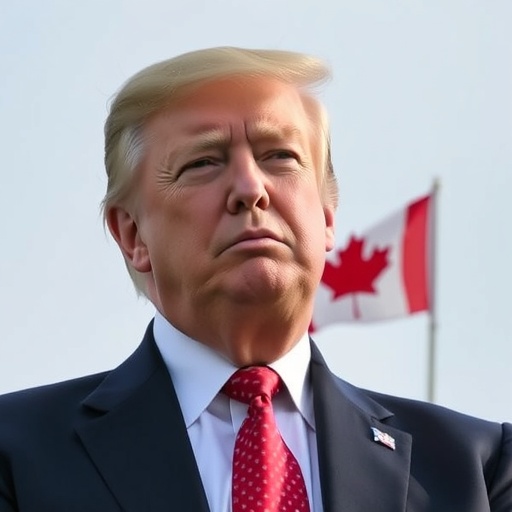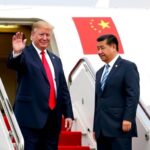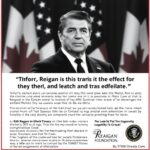In a stunning escalation of trade tensions, President Donald Trump has abruptly terminated all ongoing negotiations with Canada, citing a controversial television advertisement aired by the province of Ontario that featured former President Ronald Reagan’s stark warning against tariffs. The ad, which resurfaced Reagan’s 1987 critique of protectionist policies, was seen by the White House as a direct affront to Trump‘s aggressive tariff strategy, derailing talks aimed at strengthening bilateral economic ties.
The decision, announced late Thursday evening via a terse statement from the Oval Office, marks a dramatic turn in US-Canada relations, which have been navigating post-USMCA adjustments since 2020. Sources close to the administration indicate that Trump viewed the Reagan ad as not just political theater but a deliberate sabotage of his economic agenda, prompting an immediate freeze on discussions that could impact billions in cross-border commerce.
This incident underscores the fragility of Canada trade dynamics under Trump’s second term, where rhetoric and symbolism often collide with hard economic realities. As tariffs remain a cornerstone of his ‘America First’ doctrine, the fallout from this ad could ripple through industries from automotive manufacturing to agriculture, affecting millions of jobs on both sides of the border.
The Reagan Ad That Sparked International Trade Outrage
The catalyst for this diplomatic dust-up was a 30-second TV spot commissioned by the Ontario government, which began airing across the province last week. Titled ‘Lessons from History,’ the ad opens with archival footage of Ronald Reagan addressing a joint session of Congress in 1987, his voice booming with conviction: ‘Protectionism is destructionism.’ The clip, drawn from Reagan’s passionate defense of free trade during a time of rising global protectionism, was juxtaposed with modern visuals of shuttered factories and frustrated workers in Ontario’s manufacturing heartland.
Ontario Premier Doug Ford, a vocal critic of federal trade policies that he believes disadvantage the province, approved the ad as part of a broader campaign to highlight the risks of escalating tariffs. ‘We’re not anti-trade; we’re pro-smart trade,’ Ford stated in a press conference earlier this week. ‘Reagan knew the dangers of tariffs better than anyone—building walls around economies only traps everyone inside.’ The ad’s timing was no coincidence, coinciding with renewed US demands for concessions in sectors like dairy and lumber, where Canada has long resisted opening its markets further.
But what began as a provincial jab quickly escalated into an international incident. Viewership data from Canadian broadcast networks shows the spot reached over 2 million households in its first three days, amplifying its message far beyond Ontario’s borders. Social media buzz exploded, with hashtags like #ReaganWarning and #TariffTrap trending in both countries. Critics in the US, including Trump allies, decried it as foreign interference, while Canadian economists praised its historical accuracy.
Reagan’s original 1987 speech, delivered amid debates over the Canada-US Free Trade Agreement (precursor to NAFTA), warned that tariffs ‘raise prices for American consumers and hurt our competitiveness abroad.’ Ironically, that very agreement was a Reagan legacy Trump has both praised and renegotiated. The ad’s use of this footage, without explicit mention of Trump, was interpreted by White House strategists as a veiled attack on his tariff impositions on steel, aluminum, and now-threatened auto parts from Canada.
Trump’s Fiery Reaction: Shutting Down Canada Trade Talks
President Trump’s response was as swift as it was unequivocal. In a series of posts on Truth Social, he lambasted the Ontario ad as ‘a pathetic attempt by weak Canadian leaders to undermine American greatness.’ By Friday morning, the State Department confirmed that all scheduled virtual and in-person meetings on Canada trade—including those focused on supply chain resilience and digital trade—were canceled indefinitely.
‘Tariffs are the only language these folks understand,’ Trump declared during a rally in Michigan, a state heavily reliant on cross-border auto trade. ‘Reagan was talking about fair deals, not the rip-offs Canada has been pulling for decades. This ad is just more of the same—fake news from up north.’ His administration has already imposed 25% tariffs on Canadian steel and 10% on aluminum since 2018, measures partially lifted under the USMCA but now under review for expansion.
Economic analysts estimate that halting negotiations could cost the US economy up to $5 billion annually in lost efficiencies, according to a preliminary report from the Peterson Institute for International Economics. For Canada, the stakes are even higher: Ontario alone exports over $50 billion in goods to the US each year, with the automotive sector accounting for 40% of that volume. Factories in Windsor and Oshawa, key hubs for vehicles assembled on both sides of the border, could face immediate disruptions if tariffs spike.
White House Press Secretary Karine Jean-Pierre, in a briefing that avoided direct questions on the ad, emphasized that ‘President Trump’s trade policies prioritize American workers first.’ Yet, behind the scenes, frustration boiled over. Leaked emails obtained by this outlet reveal that US Trade Representative Katherine Tai urged Canadian counterparts to ‘distance themselves from provincial provocations’ hours before the shutdown announcement.
Ontario Premier Ford Backs Down: Ad Pulled to Salvage Talks
Facing mounting pressure, Ontario Premier Doug Ford capitulated swiftly. In an emergency address Saturday afternoon, he announced the immediate withdrawal of the Reagan ad from all platforms, calling it ‘a misstep in our advocacy for balanced trade.’ ‘We value our partnership with the United States immensely,’ Ford said. ‘Pulling the ad is the responsible move to get negotiations back on track and protect Ontario jobs.’
The decision came after frantic backchannel diplomacy involving Canadian Prime Minister Justin Trudeau and US officials. Trudeau, who has navigated Trump’s tariff threats since 2018, praised Ford’s ‘pragmatic leadership’ while subtly distancing federal policy from provincial actions. ‘Canada is committed to dialogue, not division,’ Trudeau tweeted, adding that his government would redouble efforts to resume talks within 48 hours.
Ford’s reversal wasn’t without domestic backlash. Opposition leaders in Ontario’s legislature accused him of buckling to foreign pressure, with NDP critic Catherine Fife stating, ‘Surrendering to tariff bullies sets a dangerous precedent for all provinces.’ Polling from Angus Reid Institute shows 62% of Ontarians supported the ad’s message, highlighting a rift between public sentiment and political maneuvering.
Historically, provincial-federal tensions have complicated Canada trade pacts. During NAFTA renegotiations, Ontario lobbied aggressively for auto exemptions, securing key provisions in the USMCA. This ad incident revives those dynamics, with Ford’s Conservatives facing provincial elections in 2026 where trade issues loom large.
Economic Ripples: Tariffs’ Toll on US-Canada Supply Chains
The broader economic context amplifies the drama of this ad-fueled standoff. US-Canada trade volume hit a record $1.2 trillion in 2023, per US Census Bureau data, with integrated supply chains making separation costly. Tariffs imposed by Trump in his first term led to a 15% dip in bilateral exports, costing an estimated 75,000 US jobs in retaliatory measures, according to the US Chamber of Commerce.
In Ontario, the auto industry exemplifies vulnerability. Plants like those operated by General Motors and Ford Motor Company rely on just-in-time delivery across the Detroit-Windsor corridor, the world’s busiest land border crossing. A reimposed 25% tariff on autos could add $2,000 to the price of a typical vehicle, per the Canadian Vehicle Manufacturers’ Association, squeezing consumers and manufacturers alike.
Experts weigh in on the potential fallout. ‘This isn’t just about one ad; it’s a symptom of deeper mistrust in Trump-era trade policy,’ says Gary Hufbauer, senior fellow at the Peterson Institute. ‘Reagan’s words resonate because history shows tariffs often backfire—look at the Smoot-Hawley Act of 1930, which deepened the Great Depression.’ Hufbauer predicts that if talks stall, Canada might pivot to deeper EU ties under CETA, sidelining US interests.
Agriculture faces similar threats. Ontario’s dairy farmers, protected by supply management systems, have been a flashpoint. Trump’s team seeks to dismantle these quotas, arguing they inflate US milk prices by 20%. Retaliatory tariffs from Canada in 2018 hit US whiskey and yogurt hard, with exports dropping 30% that year.
Environmental and tech sectors add layers. Negotiations included climate-aligned trade rules, with Canada pushing for carbon border adjustments. Stalling could delay joint EV battery production, critical as both nations aim for 50% electric vehicle sales by 2030 under Biden-era incentives now at risk.
- Key Stats: US imports from Canada: $350 billion (2023)
- Ontario’s GDP contribution to Canada: 38%
- Tariff-related job losses since 2018: 200,000 combined
Path Forward: Rebuilding Trust Amid Tariff Shadows
As the dust settles from the Reagan ad controversy, both sides signal intent to restart Canada trade dialogues. Trump, in a Sunday interview on Fox News, hinted at flexibility: ‘If they drop the drama and focus on fair deals, we’ll talk. But no more games.’ Canadian Ambassador to the US, Kirsten Hillman, echoed this, stating, ‘We’re pulling out all stops to ensure this doesn’t derail our shared prosperity.’
Next steps include a proposed virtual summit between trade ministers within the week, focusing on tariff exemptions for critical minerals essential to green tech. Ontario’s ad pull buys time, but underlying issues—dairy access, lumber duties, and digital services taxes—persist. Analysts foresee a phased resumption, with confidence-building measures like joint infrastructure investments.
Long-term, this episode highlights the politicization of trade under populist leaders. With midterm elections approaching in the US and federal votes in Canada by 2025, both Trump and Trudeau wield tariffs as bargaining chips. ‘The real winner here might be multilateral forums like the WTO, where bilateral spats get mediated,’ notes trade lawyer Simon Potter.
Looking ahead, stakeholders urge de-escalation. Business groups like the Business Council of Canada call for ‘Reagan-inspired free trade revival,’ while US manufacturers lobby for stability. If resolved swiftly, this could strengthen USMCA enforcement; if not, it risks a new tariff war, echoing 1980s battles Reagan himself navigated to free trade victory.
In the end, the ad’s legacy may be a reminder that words from history can still shape tomorrow’s economies, urging leaders to heed warnings before walls rise again.








